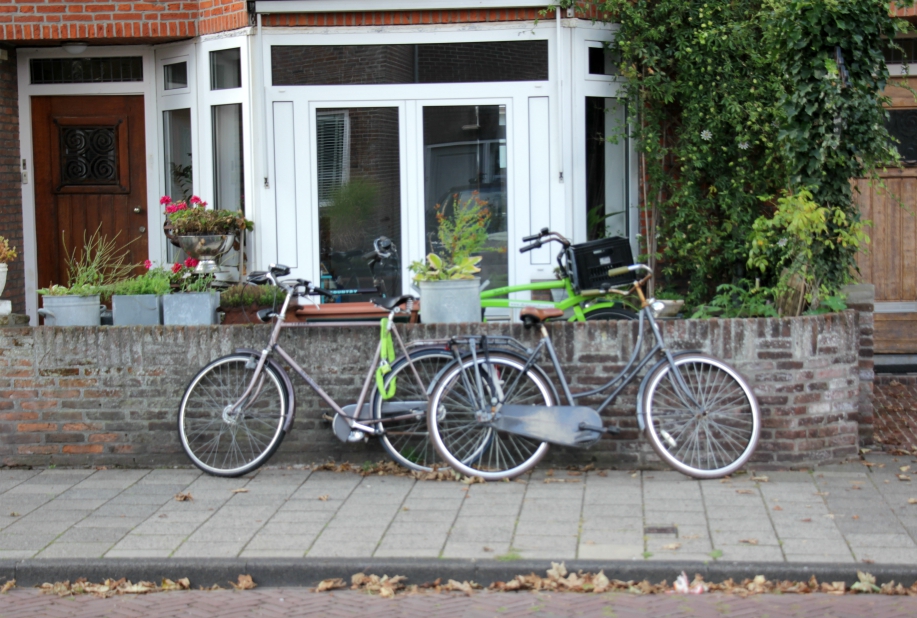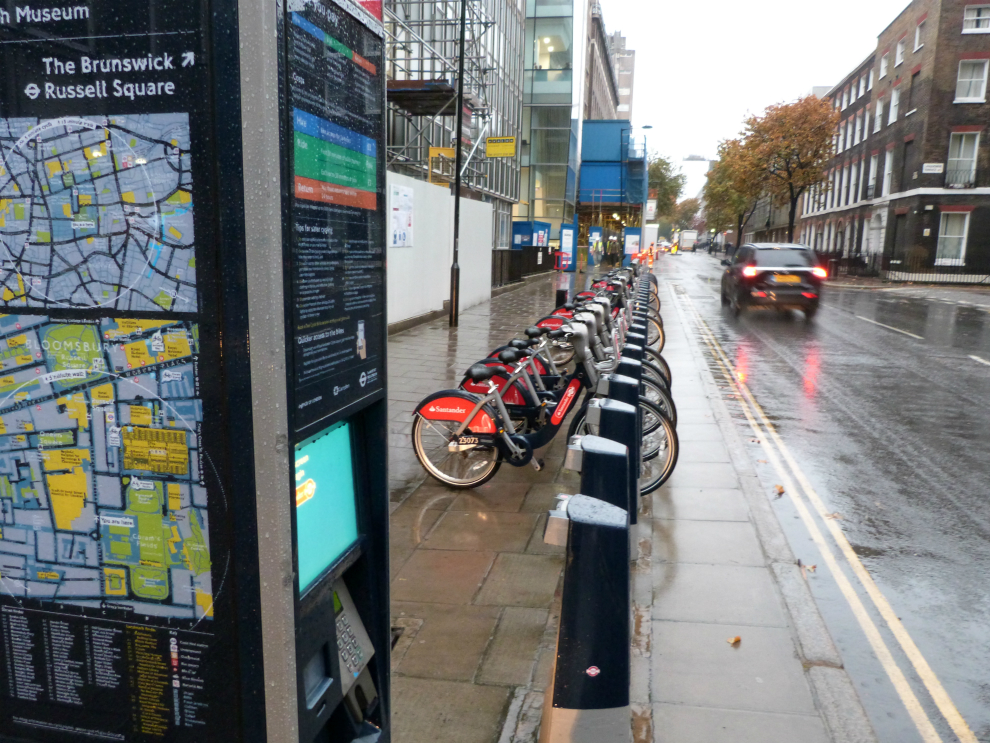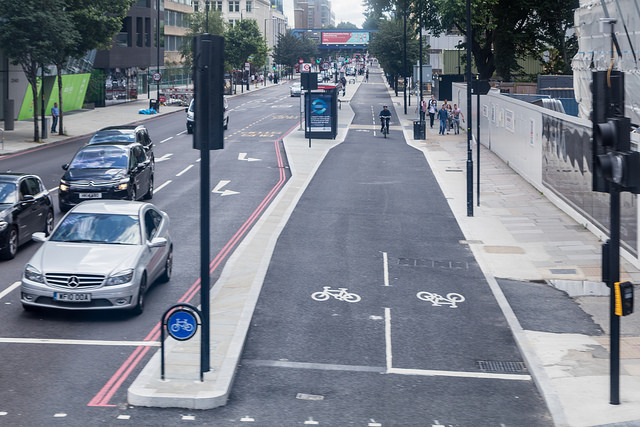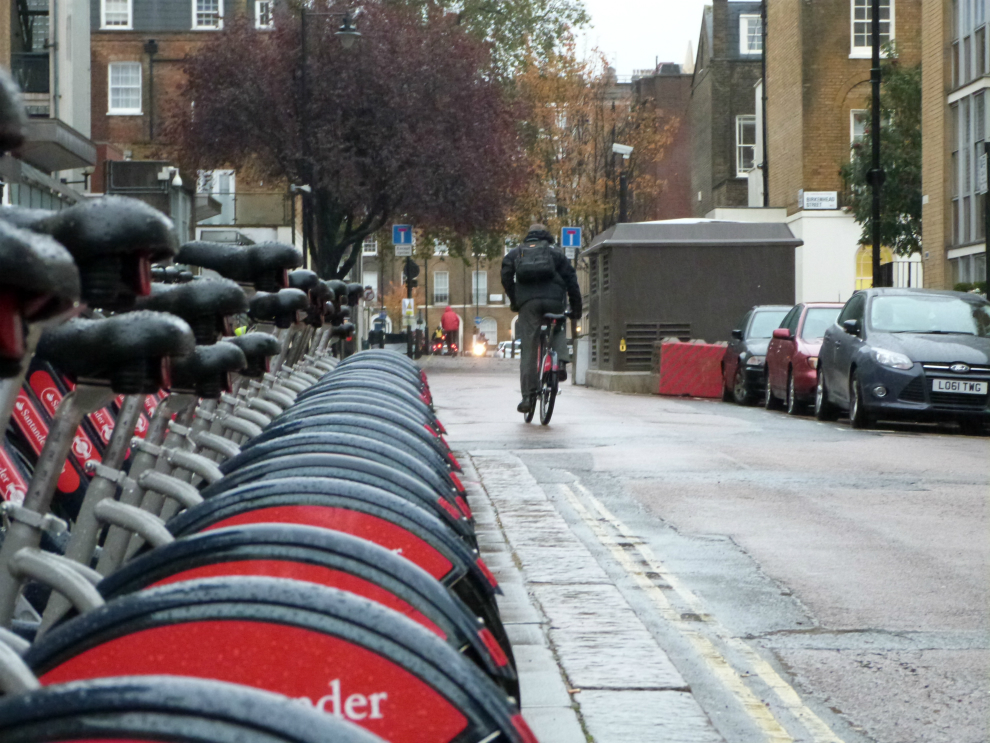Cycling minister Jesse Norman
His response to the Charlie Alliston case - a review of cycling
offences and letter to cycling organisations
2nd October 2017
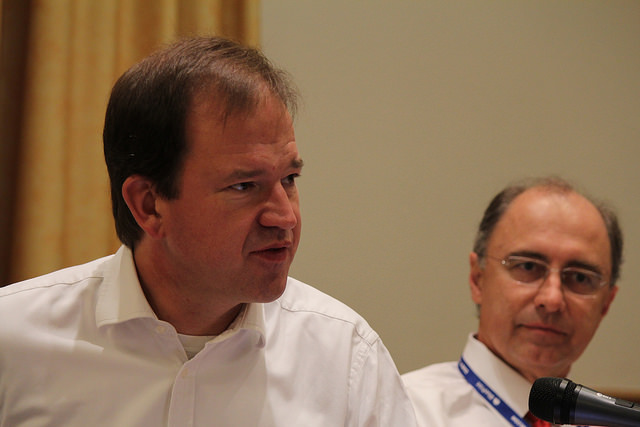
Jesse
Norman, minister responsible for cycling in the DfT, by Policy
Exchange, Licence
CC BY 2.0
The new minister with responsibility for
cycling in DfT, Jesse Norman, has responded to the Charlie
Alliston case in a controversial way. Does his reaction represent
conscientious government, or cynical populism?
As is well-known, Charlie Alliston was involved in a collision with
Kim Briggs. Alliston was riding a track bike without a front brake
in London; Mrs Briggs stepped off the pavement, and Alliston was
unable to stop in time to avoid her. They clashed heads, and Mrs
Briggs died as a result.
Charlie Alliston was acquitted of manslaughter, but convicted of
'wanton and furious driving'. He was jailed for 18 months.
Since the trial, Mrs Briggs' husband, Matt Briggs, has campaigned
for a new law to deal with death or serious injury by dangerous
cycling. He had a meeting with cycling minister Jesse Norman.
Mr Briggs isn't anti-cycling - he rides a bike in London himself
sometimes. He and his family have suffered a terrible loss, and he
is quite entitled to highlight inconsistencies and gaps in the law
which have affected his case, and campaign for change.
Mr Norman, on the other hand, has a duty to act on the basis of
evidence not popular sentiment. If he introduces new cycling
offences as part of a balanced programme to make the roads safer for
all users, nobody will object. If he is jumping on a populist
bandwagon, and demonising and singling out bike riders for harsh
treatment, after years when his department ignored calls for
measures to make cycling safer, that will be unacceptable.
Cycling minister Jesse Norman: a review to consider new offences
for cycling
On 21st September 2017, Mr Norman announced
an urgent review 'following a series of high-profile incidents
involving cyclists', to look into whether new offences of causing
death or serious injury by careless or dangerous cycling should be
introduced, 'as well as wider improvements for cycling road safety
issues'.
Mr Norman is quoted as saying, 'It's great that cycling has become
so popular in recent years but we need to make sure that our road
safety rules keep pace with this change. We already have strict laws
that ensure drivers who put people's lives at risk are punished but,
given recent cases, it is only right for us to look at whether
dangerous cyclists should face the same consequences.'
The announcement identifies that in 2015, two pedestrians were
killed and 96 seriously injured after being hit by a bicycle; and
every year on Britain's roads, more than 100 cyclists are killed,
and more than 3,000 seriously injured.
The review is to be in two phases: phase one looking at introducing
the new offences of careless and/or dangerous cycling, and phase two
a wider consultation on road safety issues relating to cycling, to
consider 'ways in which safety can be further improved between
cyclists, pedestrians and motorists.'
Comment on the cycling minister's announcement
What's important, facts or high-profile media reports?
The announcement looks like a knee-jerk reaction designed to pander
to right-wing tabloids. The words of the announcement acknowledge as
much - it refers to 'high-profile incidents', suggesting that action
should be based on how much publicity a case generates, rather than
the facts of the case.
The BBC gave quite disproportionate prominence to the Alliston
case, making his case the lead news article on its website, and
referring to him in its headline as 'cyclist'. Meanwhile, there are
many, many more cases where bad driving results in serious injury or
death, but none of those is covered in the same way.
I have read about Mr Alliston's case, but I don't know which other
cases are part of the 'series'.
As Laura
Laker pointed out in the Guardian, in June this year Mr Norman
wrote an opinion piece for the Financial Times in which he warned
against 'a populist yearning to ignore inconvenient facts and rush
to judgment'.
It looks populist and hypocritical to prioritise looking at new
cycling offences when the problem of people on bikes being injured
by vehicles is, on the figures cited in the announcement, between 31
and 50 times greater than the problem of people on bikes causing
injury.
What happened to the 2014 review of road traffic offences and
sentences?
In May 2014, a wide-ranging review of all road traffic offences and
sentencing was announced by the government. It was due to look at
the distinction between careless and dangerous driving, and how
these offences are applied in practice. The cycling organisations
were in favour of the review. By December 2016, it still hadn't
happened, but it was downgraded to look only at increasing
sentences for the most serious offenders. It still hasn't been
published.
Contrast the government's approach: when it comes to protecting
vulnerable road users, more than three years after announcing a
review, nothing has happened; in response to one cycling incident,
there is an urgent review which will report in three months.
Mr Norman is 'urgently' looking at offences which may be charged
once a decade, while turning a blind eye to real problems on
Britain's roads.
Popularity of cycling
Mr Norman says cycling has become much more popular in recent
years, but unfortunately, he isn't correct. As Peter
Walker points out, journeys by bike remain obstinately stuck
at 1-2% of total journeys.
There are already strict laws which 'ensure' dangerous drivers are
punished, says Mr Norman
Mr Norman asserts that strict laws already ensure that dangerous
drivers are punished, but that just isn't true.
When Stan Coates was riding his bike, he was hit and injured by a
driver blinded by the sun; then hit at the roadside and killed by
another driver, also blinded by the sun, 15 minutes later. Both
drivers were cleared
of causing death by careless driving by a jury at Newcastle
Crown Court. One of the drivers was found guilty of a lesser charge
of careless driving and fined £400. Is that an example of strict
laws working as they should to ensure drivers who injure or kill are
punished?
When 73-year
old Colin Crowther was killed while cycling by a driver who
was blinded by the sun, what happened? The driver who killed him was
cleared by a jury of causing death by careless driving. 'I am sorry
about the outcome, but I honestly don't think there was anything I
could have done to avoid it,' the driver said. Is this an example of
strict laws punishing drivers who kill? Or is it really not even
careless to drive around without being able to see where you're
going?
When a
driver caused serious injuries to Robert Anderson by driving
into the back of him on a B-road, was there a severe punishment? No,
because the driver didn't see him due to being blinded by a low sun,
and pleaded guilty to a reduced charge of careless driving; the
result was a fine of £1,000.
When 72-year
old Rod Bartley was out cycling, a tractor turned right across his
path and hit him, rendering him tetraplegic and in need of
constant medical care. The tractor driver was fined £80 for driving
without due care and attention. Is this an example of the strict
laws which punish dangerous drivers?
What was the penalty for driving
into a group of cyclists from behind and killing Rob
Jefferies? A 12-month community order, for causing death by careless
driving. Is this an example of the existing strict laws which punish
people who kill by driving carelessly?
Was there justice for David Irving, 48, who was hit on the
head by the wing mirror of a minibus and knocked off his bike,
then run over and killed? No, the jury acquitted the minibus driver
of causing death by driving without due care and attention. Is this
an example of the strict laws which punish drivers?
I could go on, but I think that's enough. It's too soon to comment
on the case of Declan
Shea, killed while riding his bike in Essex, or the
36-year-old woman killed
while riding her bike on Chelsea Bridge.
Cycling minister Jesse Norman: letter to cycling organisations
48h after the announcement of the review came a letter
from Mr Norman to cycling organisations, asking them to remind
their members to follow the Highway Code.
Comment on cycling minister's letter
Among the people Mr Norman sent the letter to is Chris Boardman, in
his capacity as TfGM walking and cycling commissioner. Boardman has
led campaigns for British Cycling which included suggestions for
changes to the Highway Code to improve conditions for walking and
cycling. (His ideas were not adopted, of course). He doesn't need Mr
Norman to send him letters about the Highway Code. Further, Boardman's mum
Carol was killed while cycling. It's particularly insensitive
of Norman to write to Chris Boardman of all people about the Highway
Code and road safety.
Like the review announcement, this letter seems to be peculiarly
one-eyed. Mr Norman is firing off letters to cycling organisations
at the drop of a hat, but does he think all other road users follow
the Highway Code? And if not, why isn't he writing to them?
I wrote to my MP, and to Robert Goodwill when he was minister for
cycling, pointing out that rule 163 is routinely
disregarded when overtaking cyclists, and that this is
putting people off cycling on the roads. I asked for measures
to be taken to highlight this part of the Highway Code, but of
course this was dismissed.
On 23rd September 2017, Mark Treasure tweeted this video of a car
passenger pushing a man riding a bike into a bus shelter.
As a result, will Mr Norman be writing to the AA and the RAC asking
their members not to do this? I would guess not, as it would be daft
and pointless. The idiots who assaulted a man on a bike did so
because they are idiots and criminals, not because they were in a
car.
If Mr Norman stopped to think for one moment, he might realise that
the same applies to British Cycling and Cycling UK. They don't
represent Charlie Alliston any more than the AA represents the young
thugs who made that video.
Cycling minister Jesse Norman: an awful start
We have had a succession of ministers given responsibility for
cycling in the DfT.
Each one seems to kick off their tenure with some appallingly crass
comments or actions, demonstrating ignorance of the issues facing
people who ride bikes in Britain.
Perhaps Jesse Norman is committed to cycling; perhaps he only looks
as though he is hostile to people on bikes; perhaps it just looks as
though he is applying different standards to cyclists as compared to
other road users; perhaps his review will be evidence-based and
genuinely result in improvements to road safety, not a populist
exercise in playing to the gallery. It's just that the signs so far
are anything but encouraging.



